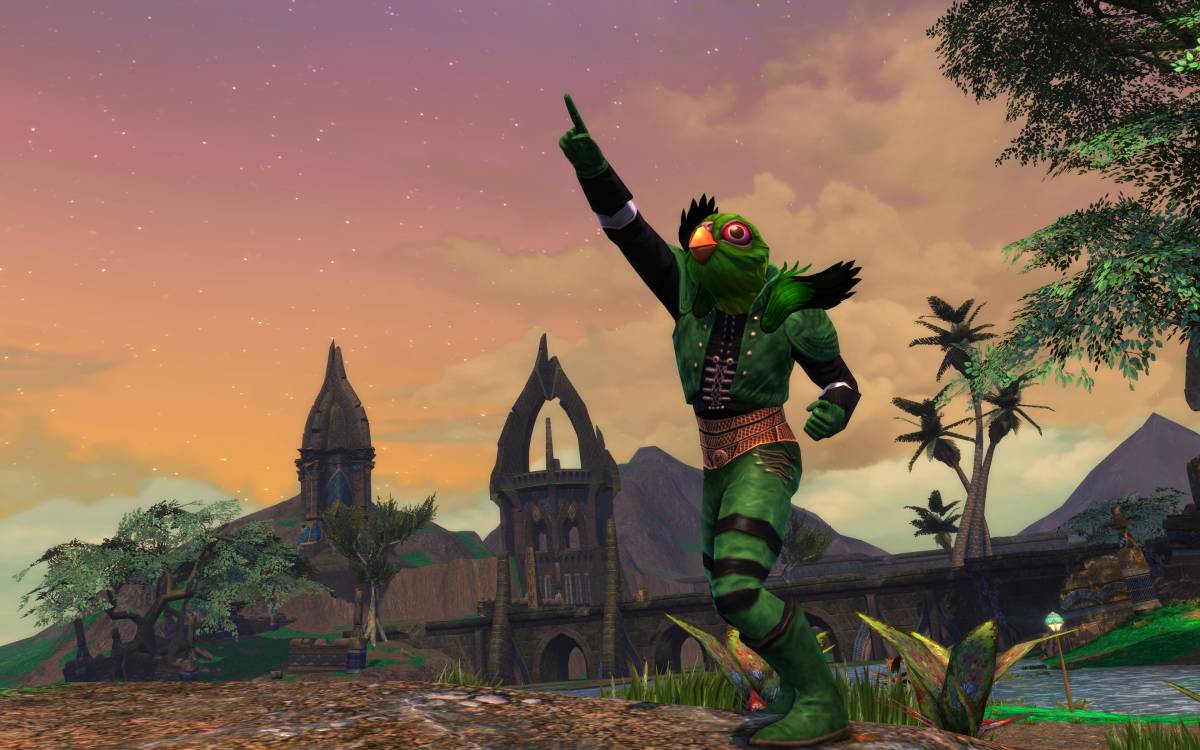
I don’t think a day goes by without gamers ranting on Reddit or Twitter or forums or comment sections about how their freedom of speech was violated because a forum post was removed or they received a ban for something they said. Whatever happened, it’s never the individual’s fault; it’s always the big-bad business impinging on the individual’s rights to control the narrative and boost profits… or something.
Every time I see one of these tired rants, I consider doing this piece on speech protections in MMOs. My research for our article on Section 230 made clear that as individuals, we don’t have totally free speech because a platform is legally entitled to unilaterally moderate any content, objectionable or not. That’s about as “not free speech”-y as you can get.
But I wondered what the law actually says. First Amendment law is notoriously complex, with lots of competing people, companies, and individuals. I actually started my research expecting this to be pretty cut and dried, even knowing the complexity of the freedom of speech. But what I found as I started digging was even more complicated than what I expected.
As a result, I narrowed the scope of this article because I didn’t want to write a novel and you didn’t want to read a novel. I’ll cover individual rights, corporate rights, and the interplay with Section 230. But there are several other layers here that I didn’t cover. As complex as just this piece seems, fam, it gets worse. So let’s get down to it.
Free speech for whom?
When we are talking about the freedom of speech, regardless of the jurisdiction, free speech applies differently at different levels. For the sake of simplicity and the scope of this article, I’m going to focus primarily on United States and First Amendment protections and obligations, though many of the same principles apply throughout the EU.
Do you have the right to free speech in MMOs?
Nope, you don’t. In the United States, the First Amendment protection of freedom of speech applies only to the government’s restriction on speech, not to private organizations. Since a business is not part of the government, it is not obligated to uphold the freedom of speech. In practice, what that means is that you could see your least favorite (or most favorite? I forget how this works with us) MMO developer walking down the sidewalk, and you could walk up and start lobbing complaints. While politicians aren’t obligated to listen to you, they cannot actually stop you from saying these things.
However, let’s say that you were in a restaurant and saw the same MMO developer. While the politician couldn’t actually prevent you from lobbing complaints, the owner of the restaurant could. The restaurant owner could force you to stop talking under threat of removal from the premises, and it would still not violate your freedom of speech. In fact, allowing you to continue to lob complaints at the developer explicitly against the wishes of the restaurant owner is a violation of the owner’s freedom of speech.
Corporations and free speech
Why does a business have First Amendment protection? Because a corporation is legal person. A legal person is an entity that qualifies as a person under the law – in this case, a business. Ironically, the foundation here is the Fourteenth Amendment. In 1936, the Supreme Court of the United States heard Grosjean v. American Press Co.. In Grosjean, a politician convinced his political allies to increase taxes on newspapers that were critical of him, in an attempt to force them to be more favorable to him. The Supreme Court, in reviewing the case, defined the newspaper corporation as a “person.” Because the Supreme Court categorized American Press Co. as a legal person, the company then qualified for the protections under the Fourteenth Amendment, which then also granted it First Amendment protections because of the Equal Protection Clause of the Fourteenth Amendment (“nor deny to any person within its jurisdiction the equal protection of the laws”).
So by defining the corporation as a person, it granted the corporation equal protection under the law, including the freedom of speech granted by the First Amendment. While there are other laws supporting corporate personhood since 1936, they all hinge on these pieces – defining a corporate as a legal person under the law and the Equal Protection Clause of the Fourteenth Amendment, which specifically references person, without any qualifier.
So, an MMO developer has first amendment protections in the same way that you, as an individual person, do. In fact, technically speaking, an MMO developer has more rights than you do as an individual in the United States, but let’s not open that particular can of worms.
MMO studio rights vs. gamer rights
This is actually pretty straightforward: You agreed to this state of affairs when you signed up to play the game. The developer owns the game and everything that goes with it, and when you agree to the End User License Agreement (EULA), you are agreeing to play by its rules when you enter its “private” property, i.e., the game. Most of the time, the EULA will set limits on your freedom of speech while in the game or on the forums (and so forth), though we generally have nicer names for those things – like “Terms and Conditions” and “Code of Conduct” – but the result is the same.
Now, if the MMO developer uses any software-as-a-service (SaaS) or any software that comes with its own set of terms and conditions, then its ability to express its own freedom of speech is limited by the TOC of the SaaS agreement. For example, if an MMO company moves its communication from privately owned forums to Discord, that MMO developer’s speech is then limited by the formal Terms and Conditions and Code of Conduct of Discord, and those obligations are passed along to you, the gamer, as well.
In most cases, this is going to be completely invisible to us as gamers. The Terms and Conditions and Codes of Conduct texts are, in the grand scheme, all pretty similar, whether between businesses or between business and individuals. But it just highlights an additional complexity when it comes to free speech in a technology-driven world.
Are there exceptions to freedom of speech?
There sure are! Freedom of speech exceptions apply to speech that’s not protected – i.e, speech that the government could “meddle in” and that you could be held liable for. These exceptions include things like incitement of an “imminent lawless action,” copyrighted and trademarked speech, “fighting words,” obscenity, and threatening the life of the president. There’s also an exception for false statement of fact, but the exception is hard to nail down – for example, lies told about the government may be completely protected speech, which puts a lot of the rhetoric over that last 10 years or so in context! (Please note that these are all explicit legal terms long fought in court, and whatever you’re thinking is “incitement” probably isn’t.)
But the exceptions matter here because MMO developers frequently include these exceptions in their formal Codes of Conduct. While as players of the game we don’t have any free speech protections on a developer’s platform, there could still be liability if gamers engage in non-protected speech. If you take a look at NCsoft’s Code of Conduct, for example, you’ll see a lot of the same language as you’ll find in the free speech exceptions. This is intentional and helps limit the risk to the developer; in the event that non-protected speech is used, the developer can avoid liability by saying that your speech violated your contract with the studio.
How does Section 230 relate to this?
The freedom of speech that corporations enjoy covers a broader set of activities and expressive speech (like donations to political campaigns or issues) than what Section 230 governs – which is just the speech that happens online from users. Because that speech comes from users and not the company itself, Section 230 exists to prevent platform liability for non-protected speech.
In other words, Section 230 protects MMO developers from liability for users who engage in non-protected speech, whether or not that speech is a violation of their EULA. You might think of it like this: The EULA governs speech and conduct between the MMO platform and the player, and Section 230 governs speech and conduct between the player and the world on the MMO platform. So Section 230 protects MMO developers from some, but not all, non-protected speech as part of the “leave up” clause of Section 230.
On the flipside, it allows for Codes of Conduct and EULAs that limit protected speech on the platform and avoid liability for moderating content that MMO developers find otherwise objectionable as part of the “take down” clause.
What recourse do players have against private organizations?
In all honesty, not much. When it comes to our relationship with MMO developers and free speech, we have almost no cards in our hand. The developer controls most of the things and has almost unilateral ability to limit your speech through moderation or banning, and you have almost no recourse except to walk away.
Of course, any MMO developer that gets overzealous with moderation (or lack of moderation) runs the risk of the negative publicity that comes along with that. What’s the first thing you think of when someone talks about RUST? I would bet you a nickel that something about it being a haven for hate speech and toxicity would be one of the first things that comes to your mind. That has undoubtedly impacted the studio’s business either in persistence of players or sales overall.
Realistically, it’s rare that gamers are ever salty enough because of over-moderation to impact the game’s business. But there are numerous cases where under-moderation soiled the game’s reputation or even the developer’s reputation. So reputation swinging to either extreme is the biggest repercussion, and it’s largely what keeps MMO developers in line with not over- or under-moderating. And while it’s not specifically protected, a certain degree of free speech is expected by gamers, and a certain degree of moderation is expected. Missing either of those expectations will have repercussions for the developer, even if it’s not technically illegal.
The topic of free speech in MMOs, at first glance, seems like a simple one: Individuals have no legal free speech protections in MMOs. But as we’ve seen, there’s still plenty of nuance and complexity when it comes to whose rights are protected, when, and how. While statutorily gamers have no individual free speech when it comes to MMOs, we have a certain expectation of free speech and a certain expectation of moderation, and game developers that don’t meet those expectations face very real reputation hits and business risk. Gamers don’t want to feel unfairly silenced – but they don’t want to play in hellscapes of hate speech and bigotry either.
 Every other week, Andy McAdams braves the swarms of buzzwords and esoteric legalese of the genre to bring you Massively OP’s Lawful Neutral column, an in-depth analysis of the legal and business issues facing MMOs. Have a topic you want to see covered? Shoot him an email!
Every other week, Andy McAdams braves the swarms of buzzwords and esoteric legalese of the genre to bring you Massively OP’s Lawful Neutral column, an in-depth analysis of the legal and business issues facing MMOs. Have a topic you want to see covered? Shoot him an email!

















